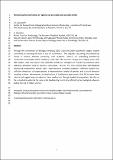Monitoring the biodiversity of regions : key principles and possible pitfalls
Abstract
Through the Convention on Biological Diversity (CBD) 2010 and 2020 biodiversity targets, nations committed to reducing the rate of loss of biodiversity. This requires calculating the biodiversity trends in nations, whereas previously, most academic research on quantifying biodiversity concerned communities within relatively small sites. We consider design and analysis issues that CBD targets raise and explore the potential pitfalls for managers of monitoring schemes when statistical principles yield to practical constraints. We list five main criteria that well-designed monitoring programmes should meet: representative sampling locations, sufficient sample size, sufficient detections of target species, a representative sample of species, and a sound temporal sampling scheme. We examine the implications of biodiversity assessments that fail to meet these criteria and suggest ways to alleviate these implications through analytical approaches. We discuss the remarkable potential for wide-scale biodiversity monitoring offered by technological advances and by the rise of citizen science.
Citation
Buckland , S T & Johnston , A 2017 , ' Monitoring the biodiversity of regions : key principles and possible pitfalls ' , Biological Conservation , vol. 214 , pp. 23-34 . https://doi.org/10.1016/j.biocon.2017.07.034
Publication
Biological Conservation
Status
Peer reviewed
ISSN
0006-3207Type
Journal article
Description
This work is based partly on Defra-funded research project BE0102 and available on the Defra Science website.Collections
Items in the St Andrews Research Repository are protected by copyright, with all rights reserved, unless otherwise indicated.

